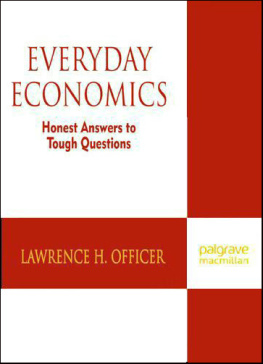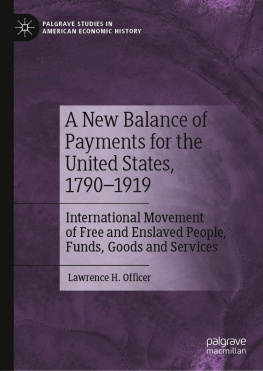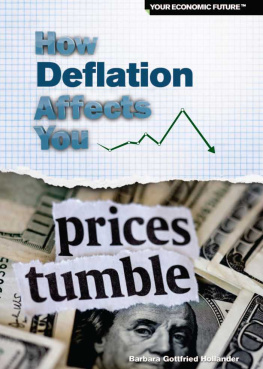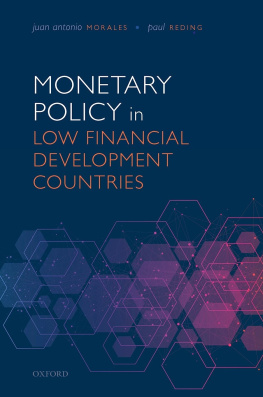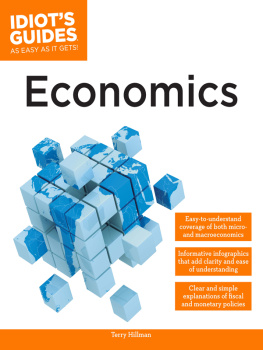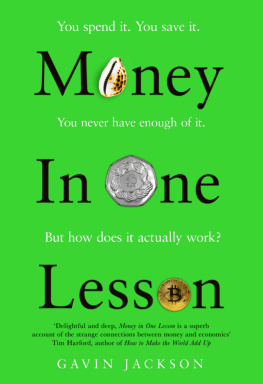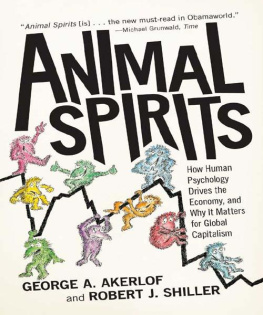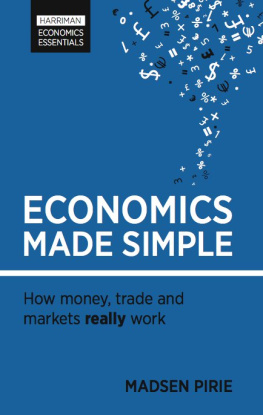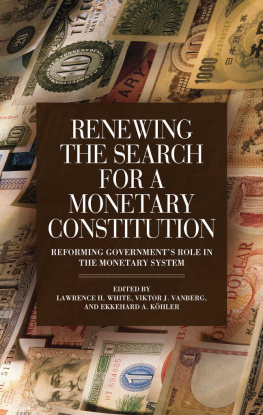E V E R Y D A Y
E C O N O M I C S
Previous Books by Lawrence H. Officer
An Econometric Model of Canada under the
Fluctuating Exchange Rate. Harvard University Press, 1968.
The International Monetary System: Problems and Proposals
(co-editor). Prentice-Hall, 1969.
Canadian Economic Problems and Policies
(co-editor). McGraw-Hill, 1970.
Supply Relationships in the Canadian Economy:
An Industry Comparison.
M.S.U. International Business and Economic Studies,
Michigan State University, 1972.
Issues in Canadian Economics
(co-editor). McGraw-Hill Ryerson, 1974.
The Monetary Approach to the Balance of Payments:
A Survey (co-author). International Finance Section,
Princeton University, 1978.
So You Have to Write an Economics Term Paper
(co-author). Michigan State University Press, 1981.
Purchasing Power Parity: Theory, Evidence and Relevance.
JAI Press, 1982.
International Economics (editor).
Kluwer-Nijhoff, 1987.
Between the Dollar-Sterling Gold Points:
Exchange Rates, Parities and Market Behavior, 17911931.
Cambridge University Press, 1996; paperback reissue, 2007.
Monetary Standards and Exchange Rates
(co-editor). Routledge, 1997.
Pricing Theory, Financing of International Organisations
and Monetary History. Routledge, 2007.
Two Centuries of Compensation for U.S. Production Workers
in Manufacturing. Palgrave Macmillan, 2009.
E V E R Y D A Y
E C O N O M I C S
Honest Answers to
Tough Questions
LAWRENCE H. OFFICER


EVERYDAY ECONOMICS
Copyright Lawrence H. Officer, 2009
All rights reserved.
First published in 2009 by PALGRAVE MACMILLAN in the United Statesa division of St. Martin's Press LLC, 175 Fifth Avenue, New York, NY 10010.
Where this book is distributed in the UK, Europe and the rest of the world, this is by Palgrave Macmillan, a division of Macmillan Publishers Limited, registered in England, company number 785998, of Houndmills, Basingstoke, Hampshire RG21 6XS.
Palgrave Macmillan is the global academic imprint of the above companies and has companies and representatives throughout the world.
Palgrave and Macmillan are registered trademarks in the United States, the United Kingdom, Europe and other countries.
ISBN-13: 9780230617117
ISBN-10: 0230617115
Library of Congress Cataloging-in-Publication Data
Officer, Lawrence H.
Everyday economics : honest answers to tough questions / Lawrence
H. Officer.
p. cm.
ISBN 9780230617117
1. Economics. I. Title.
HB171.O35 2009
330dc22
2008051405
A catalogue record of the book is available from the British Library.
Design by Letra Libre, Inc.
First edition: May 2009
10 9 8 7 6 5 4 3 2 1
Printed in the United States of America.
DEDICATION
This book is dedicated to ordinary people,
who deserve to derive power from economics.
The ideas of economists and political philosophers, both when they are right and when they are wrong, are more powerful than is commonly understood. Indeed the world is ruled by little else.
________________
John Maynard Keynes, The General Theory of Employment, Interest and Money. London: Macmillan, 1936, p. 383. Reproduced with permission of Palgrave Macmillan.
CONTENTS
Acknowledgments
Introduction (economics is for you)
Chapter 1. Meaning of Economics (refined common sense)
What is economics?
What is the difference between microeconomics and macroeconomics?
How can economics, being a science, be exciting for me to learn about?
Don't successful businesspeople operate on intuition? So is economics really useful for businesspeople?
What can learning about economics do for me?
What are the tools of economics? Any implication for my investment decisions?
What are the principal schools of thought in economics?
Aren't economists concerned about just the way things are and not about the way things ought to be?
Why can't economists agree among themselves as to what to do about the economy?
Chapter 2. Employment and Compensation (labor markets and you)
With overseas outsourcing and increased foreign competition for jobs, how do I help guide my
Why are earnings so disproportionate to contribution to society? For example, teachers and social workers earn so much less than professional athletes and movie stars.
Is there still discrimination against females and minorities in terms of getting a job, obtaining a promotion, and achieving a salary level the same as that of white males for a particular position? How do we make sure that equally productive workers are treated equally in the job market, irrespective of the gender or racial group to which a worker belongs?
Does economics have anything to say about executive compensation? In particular, will paying CEOs less money and offering fewer benefits cause American companies to become uncompetitive?
The government tells us that the unemployment rate is only 6 percent of the workforce. But it seems that a good number of my friends are without jobs. Does the official figure underestimate actual unemployment? And where does the official figure come from?
What is an economically healthy and acceptable unemployment percentage?
Chapter 3. Personal Finance (your money)
Can I outguess the market?
How can I be sure I have a comfortable retirement?
If the stock market has been trending up since its inception, why do its setbacks seem to ruin people so dramatically? Also, would buying a wide variety of stocks reduce this bad effect?
Are bonds a safer way to invest during an economic downturn?
Why shouldn't I just keep my money in a savings account?
If I have a standard savings account with a given bank, what legal protections exist for my money? What amount is absolutely guaranteed if the bank should declare bankruptcy?
How much debt is it okay to have?
Should I be paying off my credit cards in full, or is it okay to carry a balance?
How can I tell if my broker is doing a good job?
Everyone tells me that I have to know where my 401(k) is invested, and I haven't the slightest clue or really the time to do the research. How is an average person with no financial training expected to make these difficult choices that will impact his retirement fund?
If my 401(k) contribution is taxed upon withdrawal in however many years, or, as per the Roth 401(k), taxed up front but not upon withdrawal, how is it better than any other savings account? Also, what should I base my decision on with regard to whether to invest in a Roth (tax up front) 401(k) versus the standard 401(k)?
What should I do when my mortgage is transferred from one bank to another?
Chapter 4. Personal Spending (your purchases)
Since there are so many uncertainties in life, shouldn't I enjoy my money while I am young?
Is it irrational to buy Bayer aspirin instead of much cheaper generic or store-brand aspirin? After all, the chemical composition of aspirin is the same, regardless of the
Should I buy an extended warranty when I purchase a durable good, such as a refrigerator, television set, personal computer, or other appliances?
Next page
